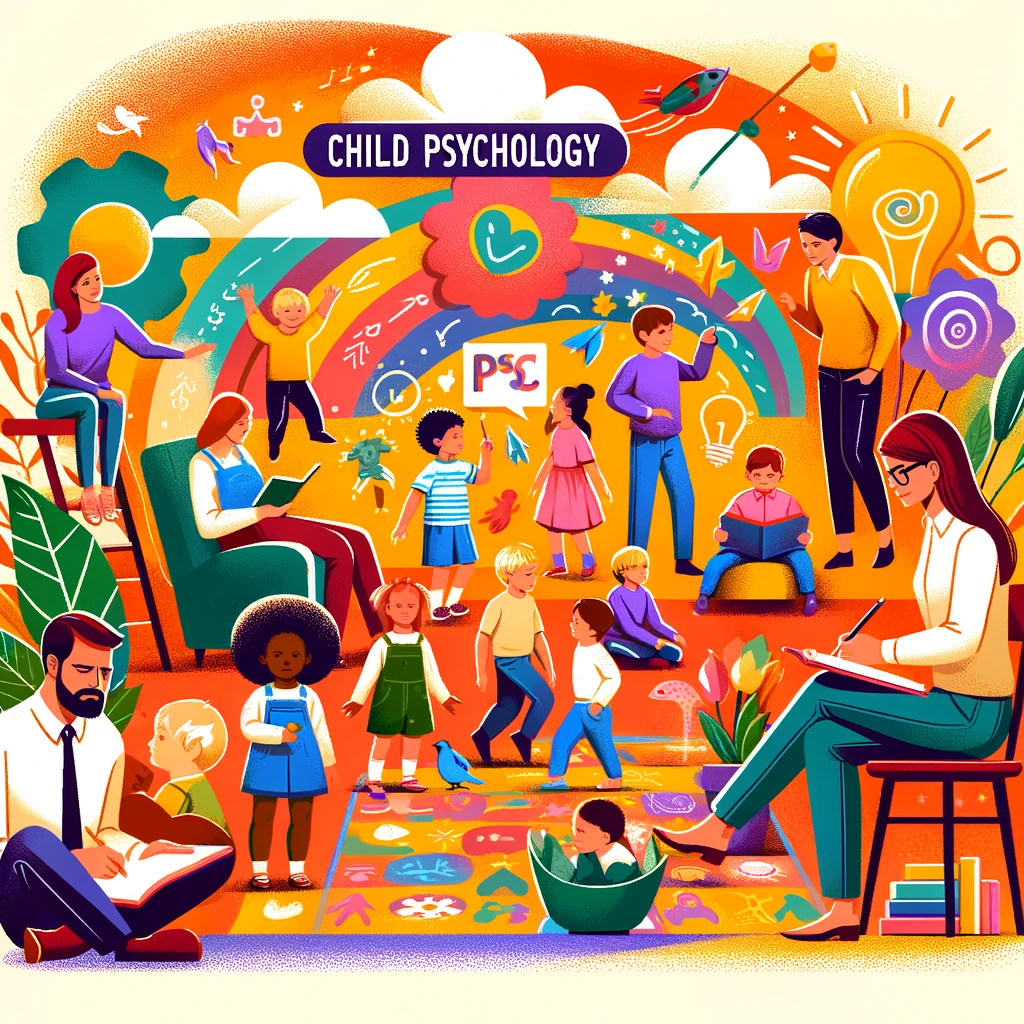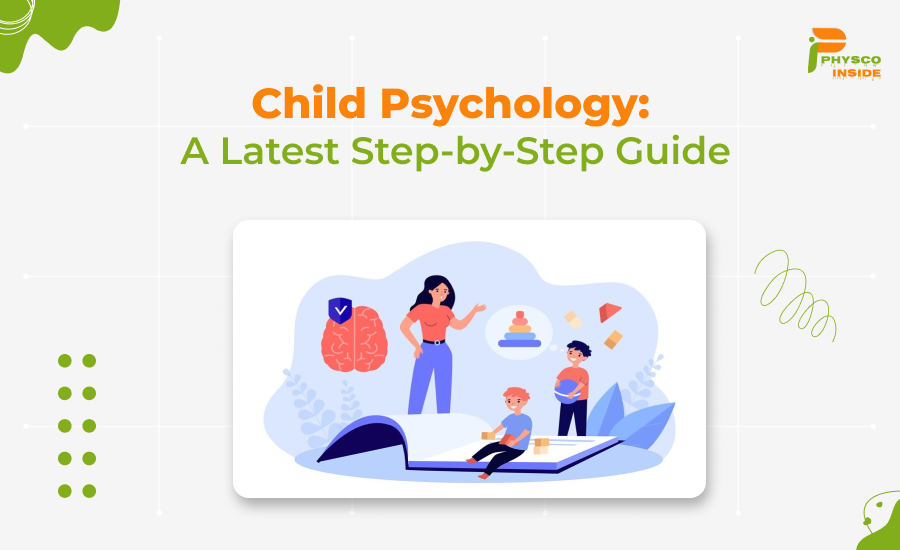(1) Introduction:
Child Psychology Examines Children’s Psychological, emotional, and social Improvement from early stages to Immaturity. It investigates how children develop, learn, see the world, and Associate with others. Understanding Influential achievements, mental, social, and deep development, Relational Abnormality, and individual gaps is Essential. Child Psychologists intend to Encourage positive development, address Difficulties, and Establish stable conditions for Children’s health.

(2) What is Child Psychology?
“Child Psychology is a branch of Psychology that focuses on Children’s mental, emotional, physical and Behavioral development from Infancy(early stages) to Immaturity.”
It Involves Children’s growth, Abilities, behaviors, emotions, relationships, and mental and social Processes as they progress through different developmental stages.
(3) What are the Different Stages of Child Psychology?
Kid’s Psychology examines different stages that children go through from birth to adolescence, each Undisputable by Unmistakable changes in physical, mental, emotional, and social development. Understanding these stages is vital for guardians, Instructors, and guardians to offer proper help and direction. Here are the various Stages of child Psychology:
(3.1) Infancy (0-2 years):
- Infancy is Characterized by quick growth and development.
- During this stage, babies depend Strongly on their Guardians for actual Consideration, support, and feeling. Key Influential achievements Participate in Coordinated Abilities.
- For example, turning over, sitting up, sliding, and at last walking. Babies also start to Encourage Fundamental mental Capacities, like item eternal quality (understanding that objects keep on Existing in any event when they are carefully hidden) and early language Abilities. Internally, children structure connections to their Guardians, which Establish the basis for later connections.
(3.2) Early Adolescence (2-6 years):
- Early childhood is a set of Sensational mental and social development.
- Children become more independent and deal with their current situations Effectively. They clarify their Coordinated movements, language Capacities, and social connections through play.
- Mental Advancement during this stage Absorbed fast language gaining typical Reasoning, and the Improvement of Essential critical thinking Abilities. Within, children start to Encourage Mindfulness and understanding, as well as deep Guideline Abilities. Socially, they begin to take part in friendly performances and structure Fellowships.
(3.3) Middle Adolescence (6-12 year):
Middle Adolescence is Represented by advanced mental and social development, as well as Expanding Independence from the Guardian. Children refine their language Abilities, grow their insight base, and Encourage more Confusing critical thinking skills. They also become more capable of Controlling their feelings and Figuring out the feelings of others. Socially, children structure peer connections, explore social orders, and Encourage a feeling of character inside their friends. Furthermore, they start to Encourage moral thinking and hold Cultural Guidelines and beliefs.
(3.4) Adolescence (12-18 years):
Adolescence is a set of critical physical, mental, emotional, and social changes as kids progress into Adulthood. Actually, Meenagers go through sexual Maturity, Encountering rapid development Disperse and sexual development. Mental development includes Improvement in unique Reasoning, thinking, and critical thinking skills. Internally, Teenagers experience raised hate for peer support and Rejection, as well as Prolonged Mindfulness and personality investigation. Socially, they further Encourage their Companion connections, start to frame close connections and investigate their jobs inside society. Youth is also a period of Expanded Risk-Taking way of Behaving and character development.
Summary
Every one of these stages Addresses a basic period in a child’s development, molding their Capacities, ways of Behaving, and Encounters. Understanding the Difficulties and valuable open doors introduced by each stage permits Parents, teachers, and guardians to offer fitting help and direction to help the child with exploring through these Influential achievements Effectively.
(4) What are the Types of Child Psychology?
There are some types of child Psychology in which we discuss about child development Abilities and social, emotional, and mental strength.

(4.1) Developmental Psychology:
- Center\Focus: Developmental Psychology research Inspects the physical, mental, emotional, and social Improvement of children from birth through youth.
- Areas of Study: It investigates key Formative achievements, like Coordinated abilities, language Obtaining, Socialization, and character Arrangement, as well as elements Affecting identity, like hereditary qualities, environment, and culture.
- Significance: Understanding average examples of Advancement and individual Variation exposes Mediation and backing systems for Youngsters with Decisive Difficulties.
(4.2) Clinical Psychology:
- Area of focus: Clinical child brain research focuses on Surveying, Diagnosing, and treating mental problems and Psychological health issues in Youngsters and youths.
- Areas of Study: It includes leading mental Evaluations, giving treatment and guiding, and creating Mediation plans for kids with conditions like Uneasiness, sadness, ADHD(Attention Deficit Hyperactivity Disorder), social issues, and injury.
- Significance: Clinical Psychology plays an Essential part in Advancing mental Prosperity and offering help to Youngsters and families Confronting mental challenges.
(4.3) Educational Psychology:
- Area of focus: Educational Psychology investigates how children learn and are encouraged inside Educational Settings, like schools and study halls.
- Areas of Study: It Researches factors Affecting learning, memory, Inspiration, and Scholastic achievement, and applies mental standards to upgrade showing techniques, Educational program plans, and Instructive Mediation.
- Significance: Educational psychologists add to working on Instructive results and tending to the different Advancing Requirements of Youngsters through Proof-Based rehearses and Interventions.
(4.4) Pediatric Psychology:
- Area of focus: Pediatric Psychology Addresses the emotional, social, and Formative parts of Pediatric illness, injury, and Clinical treatment.
- Areas of Study: It includes working with children and families Adapting to ongoing Sicknesses, Inabilities, operations, and Hospitalization, offering help, survival techniques, and Mediation to advance change and Prosperity.
- Significance: Pediatric Analysts help children and families with Exploring the Difficulties related to disease, further develop treatment beliefs, and improve personal Satisfaction.
(4.5) Social Psychology:
- Area of focus: Social Psychology Inspects how Youngsters Encourage Interactive Abilities, structure connections, and Associate with others.
- Areas of Study: It Researches points, for example, peer impact, Socialization, Conformity, Opposition, Sympathy, and personality Arrangement, Revealing insight into the social cycles that shape Youngsters’ way of behaving and development.
- Significance: Understanding social elements advances positive friend connections, reduces social struggles, and Cultivates sound social Improvement in children.
(4.6) Cognitive Psychology:
- Area of focus: Cognitive Psychology concentrates on mental cycles, for example, Perception, Problem-Solving, memory, Consideration, language, critical thinking, and dynamics in children.
- Areas of Study: It investigates how mental Capacities Encourage over the long run, how children secure information and Abilities, and how they think and reason about their general Surroundings.
- Significance: Mental Clinicians Contribute bits of knowledge to Educational experiences, mental development, and Instructive practices that help kids’ mental development and Academic achievement.
(4.7) Neuropsychology:
- Area of focus: Neuropsychology Researches the connection between brain Capability and behavior in children.
- Areas of Study: It Analyzes how Neurological circumstances, Cerebrum wounds, or Formative problems influence mental, emotional, and conduct working, Utilizing Neuropsychological Appraisals to Distinguish Qualities and Shortcomings and Illuminate mediation and medicines.
- Significance: Neuropsychologists help analyze and oversee Neurological circumstances, give recovery systems, and back children with mental and Behavioral Difficulties.
Brief Summary:
Cooperative efforts among these particular areas assist with Elevating All-Encompassing ways to deal with Children’s good health and also Improvement in child development.
(5) Which Factors Affect Child Psychology?
Children can be affected in different ways regarding Psychology, with impacts going from their initial Encounters to their Continuous connections with their current circumstances. The following are multiple manners by which children can be Impacted Mentally:
(5.1) Attachment and Bonding:
The nature of early connections Enclosed with guardians can significantly affect a child’s mental and Psychological development. Secure Attachment gives an Establishment to sound great Guidelines and Relational connections, while unclear Attachment might produce challenges there.
(5.2) Socialization and Companion Relationships:
Connections with friends and Gatherings play a significant part in social and emotional development. Positive meetings with Companions can Encourage Cooperative Abilities, Sympathy, and a feeling of having a place. Negative experiences, for example, harassment or social Rejection can prompt mental misery and low confidence.
(5.3) Biological factors:
Genetic weakness, mental health, and Hormonal changes play critical roles in forming a child’s mental development. For example, Hereditary Variables can impact attitude, knowledge, and Helplessness which leads to Psychological issues.
(5.4) Environmental Factors:
The Environment where a child grows up, including their family, school, and local area, significantly affects their mental Growth. For example, Nurturing style, financial status, permission to help, and Frankness to stress or injury can all impact a child’s mental health.
(5.5) Emotional Regulation:
Figuring out how to understand and manage Emotions is a basic part of mental development. Children who are Presented with stable conditions where their feelings are Approved and managed are considered with good emotional health. On the other hand, kids who experience disrespect, misuse, or conflict in Providing care might battle with Profound Guidelines and experience troubles. For example, tension or mindset issues.
(5.6) Identity Formation:
As children develop, they start to Encourage a healthy Self-awareness and lay out their character. This cycle is Impacted by elements like Relational Abnormality, social foundation, peer connections, and Cultural Assumptions. Children might Encounter character investigation and may fight with Inquiries of Self-Idea, Orientation personality, and social way of life as they explore this Formative stage.
(5.7) Trauma and Adversity:
Openness to horrible issues or Unfavorable Encounters, like abuse, Disregard, or family clashes, can significantly affect a kid’s mental Prosperity. Injury can upset sound turn of events and lead to a scope of mental side effects. It includes Post-Traumatic Stress Disorder (PTSD), Depression, and social issues.
(5.8) Resilience and Coping:
Regardless of Challenging Difficulties, numerous children show strength and Versatile survival techniques that assist them with Exploring Irritating conditions. Factors like strong connections, entrance to assets, and individual Qualities can advance strength and reduce the adverse concerns of Misfortune on Children’s mental health.
Generally speaking, children can be Impacted in various ways Psychologically, and understanding these impacts is Fundamental for Advancing healthy development and tending to mental worries in children.
(6) What are the Disorders of Child Psychology?
Various issues can influence a kid’s Psychology, going from normal circumstances like Uneasiness and sorrow to more obvious Neuro-Developmental problems, for example, Hormone Imbalance. Here is a rundown of a portion of the significant problems that can influence a child’s Psychology:
(6.1) Anxiety Problems:
- Evaluation Uneasiness Issue (Stray)
- Social Tension Issue
- Fear of Rejection
- Specific Fears
(6.2) State of mind Problems:
- Major Depression (Gloom)
- Bipolar Confusion
(6.3) Neurodevelopmental Issues:
- Autism Spectrum Disorder (ASD) (Neuro developmental Disorder with social, Compatibility weakness and Unnecessary ways of Behaving.
- Attention-Deficit/Hyperactivity Disorder (ADHD). This Disorder is set apart by Absent-Mindedness, Hyperactivity, and Impulsivity, Frequently Influencing academic and social work)
- Academic Formative Problem (Academic Incapacity)
- Specific Learning Issues (e.g., Dyslexia, Dyscalculia)
(6.4) Troublesome, Drive Control, and Direct Issues:
- Oppositional Defiant Disorder(ODD) is a Childhood Disorder Characterized by determined patterns of Defiance, Hostility, and Disobedience toward parents.
- Lead Confusion
- Discontinuous dangerous Issue
(6.5) Taking care of Dietary issues:
- Avoidant/Restrictive Food Intake Disorder (ARFID) – (Dietary problem portrayed by restricted food consumption, frequently because of physical awareness or hate)
- Anorexia Nervosa
- Bulimia Nervosa
(6.6) Injury and Stressor-Related Issues:
- Post-Traumatic Stress Disorder(PTSD)
- Responsive Relational Indifference
- Change Problems
(6.7) Substance-Related and Addictive Problems:
- Substance Use Problems (e.g., Liquor Use Issues, Substance Misuse)
- Betting Confusion (can influence Teenagers)
(6.8) Sleep-Wake Issues:
- Sleep Deprivation Confusion
- Bad dream Issue
- Rest Dread Turmoil
(6.9) Neurocognitive Issues:
- Scholarly Handicap
- Correspondence Issues (e.g., Language Problems, Discourse Sound Confusion)
(6.10) Disposal Problems:
- Enuresis (Bedwetting)
- Encopresis (Ruining)
Supportive note
It’s critical to observe that every kid is brilliant, and the show and Seriousness of these problems can shift broadly. Early Identification, Mediation, and Suitable treatment are fundamental for helping children with dealing with these issues and lead Satisfying lives.
(7) How to Take Care of a Child Psychology?
Dealing with a child’s Psychology includes Supporting their Psychological, physical, social, and emotional development:
- Psychological: Energize their brains through play, investigation, and Age-suitable difficulties. Energize interest and critical thinking Abilities by giving Instructive toys and exercises.
- Physical: Ensure they have a healthy eating routine, Adequate rest, and normal activity. Plan normal Check-Ups with medical care experts to screen development and address any worries speedily.
- Social: Encourage healthy relationships with family, companions, and Guardians. Energize sharing, compassion, and Relational Abilities through friendly Cooperation and gathering exercises. Show them how to oversee clashes and regard others’ limits.
- Emotionally: Establish a strong and adored climate where they have a good sense of compassion in communicating their feelings. Approve their feelings and show them survival techniques for dealing with pressure and dissatisfaction. Model positive way of behaving and profound guideline procedures.
(8) Conclusion:
In conclusion, the promotion of Child Psychology science includes a wide methodology covering mental, physical, social, and emotional development. By giving animating conditions, sound tendencies, and stable connections, guardians can encourage flexibility and prosperity in youngsters. Stable regard for their singular necessities and achievements is critical, alongside looking for direction from experts when important. At last, putting resources into a kid’s mental development establishes the groundwork for their future achievement and delight
(9) Frequently Asked Questions
ANSWER Jean Piaget of Switzerland.
ANSWER Child psychology educates the mental, emotional, and behavioral progress of children to understand and support their well-being efficiently.
ANSWER Give a supporting environment, approve their feelings, and show them solid survival methods.
ANSWER These include language collection, critical thinking abilities, and understanding circumstances and logical results, which grow continuously from birth through childhood.
ANSWER Utilize encouraging feedback, set clear beliefs, and utilize reliable discipline procedures custom-made to your child’s age and personality.


